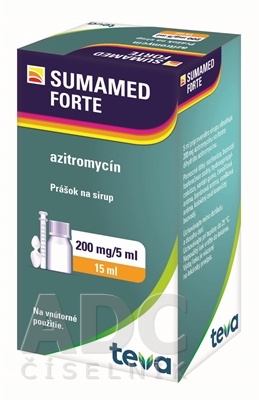

Sumamed

Ask a doctor about a prescription for Sumamed

How to use Sumamed
Leaflet attached to the packaging: patient information
SUMAMED, 100 mg/5 ml, powder for oral suspension
Azithromycin
Read the leaflet carefully before taking the medicine, as it contains important information for the patient.
- Keep this leaflet, you may need to read it again.
- In case of any doubts, consult a doctor or pharmacist.
- This medicine has been prescribed specifically for you. Do not pass it on to others. The medicine may harm another person, even if their symptoms are the same.
- -If the patient experiences any side effects, including any side effects not listed in this leaflet, they should tell their doctor or pharmacist. See section 4.
Table of contents of the leaflet
- 1. What is Sumamed and what is it used for
- 2. Important information before taking Sumamed
- 3. How to take Sumamed
- 4. Possible side effects
- 5. How to store Sumamed
- 6. Contents of the packaging and other information
1. What is Sumamed and what is it used for
Sumamed contains the active substance azithromycin, which is an azalide antibiotic from the macrolide group with a broad spectrum of action. It has a bactericidal effect on susceptible microorganisms. Sumamed in the form of powder for oral suspension is indicated for the treatment of the following infections caused by microorganisms susceptible to azithromycin.
- Upper respiratory tract infections: bacterial pharyngitis, tonsillitis, sinusitis (see also section 2).
- Acute otitis media.
- Lower respiratory tract infections: acute bronchitis, exacerbation of chronic bronchitis, mild to moderate pneumonia, including interstitial pneumonia.
- Skin and soft tissue infections: erysipelas, impetigo, and secondary infected eczema; erythema migrans - the first symptom of Lyme disease.
2. Important information before taking Sumamed
When not to take Sumamed
- If the patient is allergic to azithromycin, erythromycin, other macrolide or ketolide antibiotics, or to any of the other ingredients of this medicine (listed in section 6).
Warnings and precautions
Before starting treatment with Sumamed, the patient should discuss with their doctor or pharmacist if:
- the patient has conditions that may lead to rhythm disorders (especially in women and elderly patients):
- congenital or existing rhythm disorders (visible in the ECG - a test of heart electrical activity),
- severe heart failure,
- very slow heart rate (called bradycardia),
- electrolyte disturbances in the blood, especially low potassium and magnesium levels,
- they are taking other medicines that may cause prolongation of the QT interval in the ECG (see "Sumamed and other medicines");
- the patient has severe kidney problems;
- the patient has severe liver problems: the doctor may monitor liver function or stop treatment;
- the patient has a new infection (this may indicate excessive growth of resistant microorganisms or a fungal infection);
- the patient has neurological (neurological) or mental (psychic) disorders;
- the patient has a sexually transmitted disease: the doctor should ensure that the patient does not have a syphilis infection;
- the patient is taking ergotamine derivatives (preparations for migraine or cluster headaches);
- the patient has infected burn wounds.
Also, read the warnings in section 4.
If, despite treatment, the symptoms of the infection do not disappear or new symptoms of another infection appear, e.g. fungal, consult a doctor again.
Infections caused by streptococci
In the treatment of pharyngitis and tonsillitis caused by streptococci, the drug of choice is usually penicillin.
Pseudomembranous colitis
In case of diarrhea, report it to your doctor immediately, as it may be a symptom of pseudomembranous colitis - a complication that sometimes occurs during the use of macrolide antibiotics. Such a diagnosis should be considered in patients who develop diarrhea after starting treatment with azithromycin. In the case of pseudomembranous colitis caused by azithromycin, it may be necessary to discontinue Sumamed and use appropriate treatment. It is contraindicated to administer anti-peristaltic agents.
Long-term use
There is no data on the safety and efficacy of azithromycin used for a long time in the above indications. In the case of rapidly recurring infections, the doctor will consider treatment with another antibacterial agent.
Myasthenia
During treatment with azithromycin, exacerbation of myasthenia symptoms or the occurrence of myasthenic syndrome (see "Possible side effects") has been observed.
Treatment of infections caused by the Mycobacterium avium complex in children
The safety and efficacy of azithromycin in the treatment of infections caused by the Mycobacterium avium complex or in the prevention of such infections in children have not been established.
Children and adolescents
The dose is modified depending on body weight (see section 3).
Sumamed and other medicines
Tell your doctor or pharmacist about all medicines you are taking, have recently taken, or plan to take.
If you are taking any of the following medicines, it is especially important to tell your doctor or pharmacist:
- medicines that affect the QT interval, such as
- quinidine, procainamide, dofetilide, amiodarone, sotalol (used to treat rhythm disorders),
- hydroxychloroquine (used to treat rheumatologic diseases or malaria),
- cisapride (used to treat stomach disorders),
- terfenadine (used to treat allergies),
- antipsychotic medicines, e.g. pimozide,
- antidepressant medicines, e.g. citalopram,
- fluoroquinolones (used in infections), e.g. moxifloxacin, levofloxacin;
- antacids (Sumamed should be taken at least 1 hour before or 2 hours after taking antacids);
- oral anticoagulants, e.g. warfarin;
- ergot alkaloids (used in migraine or to reduce blood flow), e.g. ergotamine, which can cause ergotism when used with azithromycin (symptoms - spasm of peripheral blood vessels and ischemia);
- digoxin (used to treat heart rhythm disorders) and colchicine (used to treat gout and familial Mediterranean fever);
- cyclosporin (used in skin diseases, rheumatoid arthritis, or after organ transplantation);
- atorvastatin (a medicine used to lower cholesterol levels);
- rifabutin (used to treat HIV or tuberculosis).
Sumamed with food and drink
Sumamed can be taken independently of meals.
Pregnancy, breastfeeding, and fertility
If you are pregnant or breastfeeding, think you may be pregnant, or plan to have a child, consult your doctor or pharmacist before taking this medicine.
Pregnancy
The medicine may be used during pregnancy only if the doctor believes that the benefit to the mother outweighs the risk to the child.
Breastfeeding
Azithromycin passes into breast milk. It is recommended not to breastfeed during treatment with azithromycin, unless the doctor recommends otherwise.
Fertility
In fertility studies conducted in rodents, a decrease in the conception rate was observed after administration of azithromycin. The significance of these study results for humans is unknown.
Driving and using machines
There is no data on the effect of Sumamed on the ability to drive and use machines. However, when performing such activities, one should take into account the possibility of side effects such as dizziness and seizures.
Sumamed contains sucrose
5 ml of the suspension contains 3.863 g of sucrose.
If the patient has previously been diagnosed with intolerance to some sugars, they should consult their doctor before taking the medicine.
The medicine contains 10.04 g of sucrose in the maximum daily dose (20 mg/kg body weight - 13 ml of suspension). This should be taken into account in patients with diabetes.
Sumamed contains sulfites in cherry, banana, and vanilla flavors
The medicine may rarely cause severe hypersensitivity reactions and bronchospasm.
Sumamed contains benzyl alcohol in cherry flavor
The medicine contains 0.65 micrograms of benzyl alcohol in 5 ml of suspension. Benzyl alcohol may cause allergic reactions.
Administration of benzyl alcohol to young children is associated with the risk of serious side effects, including breathing disorders (so-called "gasping syndrome").
Do not administer to newborns (up to 4 weeks of age) without a doctor's recommendation.
Do not administer to young children (under 3 years of age) for more than a week without a doctor's or pharmacist's recommendation.
Pregnant or breastfeeding women should consult their doctor before taking the medicine, as a large amount of benzyl alcohol may accumulate in their body and cause side effects (so-called metabolic acidosis).
Patients with liver or kidney disease should consult their doctor before taking the medicine, as a large amount of benzyl alcohol may accumulate in their body and cause side effects (so-called metabolic acidosis).
Sumamed contains sodium
The medicine contains 35.28 mg of sodium (the main component of common salt) in 5 ml of suspension. This corresponds to 1.76% of the maximum recommended daily intake of sodium in the diet for adults.
The maximum daily dose of the medicine (20 mg/kg body weight - 13 ml of suspension) contains 91.73 mg of sodium.
This corresponds to 4.59% of the maximum recommended daily intake of sodium in the diet for adults.
3. How to take Sumamed
This medicine should always be taken as directed by the doctor. In case of doubts, consult a doctor or pharmacist.
The medicine is taken orally.
In upper and lower respiratory tract infections, otitis media, skin and soft tissue infections (except for erythema migrans), the total dose is 30 mg/kg body weight, i.e. 10 mg/kg body weight once a day for 3 days.
Dosing in children and adolescents
The dosing in children depends on body weight, as follows:
In the treatment of erythema migrans, the total dose is 60 mg/kg body weight, administered as follows: 20 mg/kg body weight on the first day, then 10 mg/kg body weight once a day from the 2nd to the 5th day of treatment.
Treatment of pharyngitis and tonsillitis caused by Streptococcus pyogenes
| Body weight | Azithromycin dose (suspension volume) |
| 5 kg | 50 mg (2.5 ml) |
| 6 kg | 60 mg (3 ml) |
| 7 kg | 70 mg (3.5 ml) |
| 8 kg | 80 mg (4 ml) |
| 9 kg | 90 mg (4.5 ml) |
| 10-14 kg | 100 mg (5 ml) |
In the treatment of pharyngitis caused by the bacterial species Streptococcus pyogenes in children with a body weight of up to 13 kg, azithromycin is administered either for 3 days, giving a dose of 20 mg/kg body weight once a day, or for 5 days, giving a dose of 12 mg/kg body weight once a day. Both in the 3-day and 5-day treatment, the total amount of azithromycin taken by the patient should be 60 mg/kg body weight.
The dosing of the 100 mg/5 ml suspension for children with a body weight of 5-13 kg is presented in the following table:
| Body weight in kg | Dosing
| Dosing
| Bottle content in ml |
| day 1-3. 20 mg/kg body weight/day | day 1-5. 12 mg/kg body weight/day | ||
| Azithromycin dose (suspension volume) | Azithromycin dose (suspension volume) | ||
| 5 kg | 100 mg (5 ml) | 60 mg (3 ml) | 20 ml |
| 6 kg | 120 mg (6 ml) | 72 mg (3.6 ml) | 20 ml |
| 7 kg | 140 mg (7 ml) | 84 mg (4.2 ml) | 2x20 ml |
| 8 kg | 160 mg (8 ml) | 96 mg (4.8 ml) | 2x20 ml |
| 9 kg | 180 mg (9 ml) | 108 mg (5.4 ml) | 2x20 ml |
| 10 kg | 200 mg (10 ml) | 120 mg (6 ml) | 2x20 ml |
| 11 kg | 220 mg (11 ml) | 132 mg (6.6 ml) | 2x20 ml |
| 12 kg | 240 mg (12 ml) | 144 mg (7.2 ml) | 2x20 ml |
| 13 kg | 260 mg (13 ml) | 156 mg (7.8 ml) | 2x20 ml |
Elderly patients
In elderly patients, the same dose is used as in other adult patients. Due to the risk of heart disease, caution is recommended when using the medicine in elderly patients.
Patients with kidney or liver function disorders
If the patient has kidney or liver function disorders, they should inform their doctor, as they may need to reduce the usual dose of the medicine. The medicine should not be used in patients with severe liver failure.
Method of administration
Azithromycin should be taken orally, once a day.
The prepared suspension can be taken independently of meals.
The prepared suspension should be administered orally, using the measuring syringe attached to the packaging.
Shake before each use!
After administering the medicine to a child, give them some tea or juice to drink, so that the medicine does not remain in the mouth.
Method of preparing the suspension
According to the attached instructions.
Using a higher dose of Sumamed than recommended
Side effects that occurred after taking the medicine in higher doses than recommended were similar to those described after taking the correct doses. Characteristic symptoms after overdosing on macrolide antibiotics include: transient hearing loss, severe nausea, vomiting, and diarrhea.
In case of taking a higher dose of the medicine than recommended, consult a doctor or pharmacist immediately. In case of overdose, it is recommended to administer activated charcoal and use symptomatic treatment, and if necessary, life-supporting treatment.
Missing a dose of Sumamed
Take the missed dose as soon as possible, and then take the next doses according to the recommended dosing schedule. Do not take a double dose to make up for the missed dose.
4. Possible side effects
Like all medicines, this medicine can cause side effects, although not everybody gets them.
In case of the following side effects, stop taking Sumamed and contact your doctor or go to the emergency department of the nearest hospital immediately:
Severe hypersensitivity reactions, including:
- Severe allergic reaction (sudden difficulty breathing and swallowing, swelling of the lips, tongue, face, and throat, itching rash, especially on the whole body).
- Severe skin reactions: rash characterized by rapid onset of areas of redness on the skin covered with small blisters (vesicles filled with white or yellow fluid); severe skin rash causing redness and peeling; severe blistering and bleeding from the lips, eyes, mouth, nose, and genitals, associated with high fever and joint pain. This may be "acute generalized exanthematous pustulosis" (AGEP), "erythema multiforme", "bullous erythema multiforme (Stevens-Johnson syndrome)" or "toxic epidermal necrolysis".
- Severe hypersensitivity reaction that may include fever, skin rash, swelling of organs, increased number of a certain type of white blood cells (eosinophilia), and inflammation of internal organs (drug rash with eosinophilia and systemic symptoms (DRESS)).
Also, stop taking Sumamed and contact your doctor immediately if you notice:
- Severe or persistent diarrhea with blood or mucus. This symptom may occur during or after treatment and may indicate serious colitis.
- Weakness, yellowing of the skin or whites of the eyes, and dark urine.
- Unusual tendency to bruise or bleed.
- Rapid (ventricular tachycardia) or irregular heartbeat or changes in heart rhythm in the electrocardiogram (prolongation of the QT interval and disorders of the type torsade de pointes).
The following side effects have been reported:
Very common(may occur in more than 1 in 10 patients):
- Diarrhea.
Common(may occur in up to 1 in 10 patients):
- Headache;
- Vomiting, abdominal pain, nausea;
- Change in white blood cell count;
- Decrease in bicarbonate levels in the blood.
Uncommon(may occur in up to 1 in 100 patients):
- Fungal infections (candidiasis), vaginal infection, pneumonia, fungal infection, bacterial infection, pharyngitis, gastrointestinal upset, respiratory disorders, rhinitis, oral thrush;
- Change in white blood cell count (leukopenia, neutropenia, eosinophilia);
- Angioedema (swelling in the face and throat, which can cause breathing difficulties), hypersensitivity;
- Lack of appetite (anorexia);
- Nervousness, insomnia; dizziness, drowsiness, taste disorders, abnormal skin sensations, e.g. tingling and numbness of limbs (paresthesia);
- Visual disturbances;
- Hearing disorders, balance disorders;
- Palpitations;
- Hot flashes;
- Dyspnea, epistaxis;
- Constipation, flatulence, indigestion, gastritis, dysphagia, bloating, dry mouth, belching, oral ulcers, excessive salivation;
- Rash, itching, urticaria, skin inflammation, dry skin, excessive sweating;
- Arthrosis, muscle pain, back pain, neck pain;
- Urinary disorders (dysuria), kidney pain;
- Menstrual bleeding, testicular disorders;
- Edema, weakness (asthenia), malaise (apathy), fatigue, facial edema, chest pain, fever, pain, peripheral edema;
- Abnormal laboratory test results (e.g. blood, liver function, glucose, electrolytes);
- Post-procedure complications.
Rare(may occur in up to 1 in 1000 patients):
- Agitation;
- Liver function disorders, cholestatic jaundice;
- Hypersensitivity to light, severe skin reactions: rash characterized by rapid onset of areas of redness on the skin covered with small blisters (vesicles filled with white or yellow fluid).
Frequency not known(frequency cannot be estimated from the available data):
- Pseudomembranous colitis;
- Thrombocytopenia (decreased platelet count), hemolytic anemia (decreased red blood cell count);
- Anaphylactic reaction (generalized allergic reaction, which can rarely be fatal; may occur with symptoms such as: swelling of the lips, face, or throat, leading to severe breathing difficulties, rash on the skin or urticaria);
- Aggressive behavior, anxiety, hallucinations, delusions;
- Loss of consciousness (syncope), seizures, sensory disturbances (hypoesthesia), excessive psychomotor activity, loss of smell, loss of taste, disorders of smell, rapid muscle fatigue (myasthenia);
- Hearing disorders, including deafness and/or tinnitus;
- Heart rhythm disorders (including torsade de pointesand ventricular tachycardia), prolongation of the QT interval in the electrocardiogram;
- Decrease in blood pressure;
- Pancreatitis, discoloration of the tongue;
- Liver failure (rarely fatal), fulminant hepatitis, liver necrosis;
- Severe skin reactions: bullous erythema multiforme (Stevens-Johnson syndrome), toxic epidermal necrolysis, erythema multiforme, drug rash with eosinophilia and systemic symptoms (DRESS);
- Arthralgia;
- Acute kidney failure, interstitial nephritis.
Side effects probably or possibly related to the use of azithromycin in the treatment of infections caused by Mycobacterium avium complex or in the prevention of such infections, observed during clinical trials and after the medicine was placed on the market
Very common(may occur in more than 1 in 10 patients):
- Diarrhea;
- Abdominal pain;
- Nausea;
- Bloating;
- Discomfort in the abdominal cavity;
- Loose stools.
Common(may occur in up to 1 in 10 patients):
- Lack of appetite;
- Dizziness;
- Headache;
- Abnormal skin sensations, e.g. tingling and numbness of limbs (paresthesia);
- Taste disorders;
- Visual disturbances;
- Deafness;
- Rash, itching;
- Arthralgia;
- Fatigue.
Uncommon(may occur in up to 1 in 100 patients):
- Sensory disturbances (hypoesthesia);
- Hearing disorders, tinnitus;
- Palpitations;
- Hepatitis;
- Bullous erythema multiforme (Stevens-Johnson syndrome), hypersensitivity to light;
- Sudden weakness (asthenia), malaise.
Reporting side effects
If you experience any side effects, including those not listed in this leaflet, tell your doctor or pharmacist. Side effects can be reported directly to the Department of Drug Safety Monitoring of the Office for Registration of Medicinal Products, Medical Devices, and Biocidal Products
Al. Jerozolimskie 181C, 02-222 Warsaw
Phone: +48 22 49 21 301
Fax: +48 22 49 21 309
Website: https://smz.ezdrowie.gov.pl
Side effects can also be reported to the marketing authorization holder.
Reporting side effects will help to gather more information on the safety of the medicine.
5. How to store Sumamed
- Keep the medicine out of the sight and reach of children.
- Store in a temperature below 25°C.
- Store the prepared suspension for no more than 5 days in a temperature below 25°C.
Do not use this medicine after the expiry date stated on the packaging. The expiry date refers to the last day of the month.
Medicines should not be disposed of via wastewater or household waste. Ask your pharmacist how to dispose of medicines no longer required. This will help protect the environment.
6. Contents of the packaging and other information
What Sumamed contains
- The active substance of the medicine is azithromycin in the form of azithromycin dihydrate. 5 ml of the suspension contains 100 mg of azithromycin.
- The other ingredients are: sucrose, anhydrous trisodium phosphate, hydroxypropyl cellulose, xanthan gum, anhydrous colloidal silica, cherry flavor, banana flavor, vanilla flavor.
What Sumamed looks like and contents of the pack
Sumamed is a white to yellowish-white powder.
HDPE bottles for preparing 20 ml of suspension.
Each bottle has a child-resistant closure.
Each bottle is packaged in a cardboard box. A measuring syringe is attached to the packaging.
Marketing authorization holder
Teva Pharmaceuticals Polska Sp. z o.o.
ul. Emilii Plater 53, 00-113 Warsaw
phone: (22) 345 93 00
Manufacturer
Teva Operations Poland Sp. z o.o.
ul. Mogilska 80, 31-546 Kraków
Pliva Hrvatska d.o.o. (Pliva Croatia Ltd.)\
Prilaz Baruna Filipoviča 25, 10000 Zagreb, Croatia
Date of last revision of the leaflet: April 2023
INSTRUCTIONS FOR USE OF THE MEDICINE
Preparing the oral suspension
It is best to measure the water needed to prepare the suspension with the attached measuring syringe.
- 1. The bottle contains powder, from which a suspension for oral use is prepared after adding water.
- 2. Press the bottle cap and turn it counterclockwise.
- 3. Add 12 ml of boiled, cooled water. Measure with the attached syringe 3 times 4 ml of water and add to the bottle with the medicine. The bottle then contains 5 ml of excess suspension to ensure complete dosing.

- 4. Shake vigorously until a uniform suspension is formed.
- 5. The prepared suspension should be stored in a temperature below 25°C.
The prepared suspension is stable for 5 days.
Instructions for using the measuring syringe
Before administering the medicine to a child, read the following instructions carefully.
FILLING THE SYRINGE WITH MEDICINE
- 1. Shake the suspension before use.
- 2. Press the cap and turn it counterclockwise.
- 3. Insert the syringe tip into the suspension and, pulling the plunger up, draw the appropriate amount of suspension.

- 4. If you notice an air bubble in the syringe, inject the medicine back into the bottle and repeat the steps from point 3.
ADMINISTERING THE MEDICINE TO A CHILD
- 5. Place the child in a feeding position.
- 6. Insert the syringe tip into the child's mouth.
- 7. Slowly push the plunger so that the child can swallow the medicine gradually.

- 8. After the child swallows the medicine, give them some tea or juice to drink, so that the medicine does not remain in the mouth.
CLEANING AND STORAGE
- 9. After use, disassemble the syringe, wash it under running water, dry, and store in a clean place, together with the medicine.

- 10. After administering the last dose to the child, discard the syringe together with the bottle.
Warning!
The medicine and syringe should be stored in a place inaccessible to children.
The medicine should be used strictly according to the doctor's instructions.
In case of any doubts, consult a doctor or pharmacist.
- Country of registration
- Active substance
- Prescription requiredYes
- Manufacturer
- ImporterPliva Croatia Ltd. (Pliva Hrvatska d.o.o.) Teva Operations Polska Sp. z o.o.
- This information is for reference only and does not constitute medical advice. Always consult a licensed doctor before taking any medication. Oladoctor is not responsible for medical decisions based on this content.
- Alternatives to SumamedDosage form: Tablets, 500 mgActive substance: azithromycinPrescription requiredDosage form: Tablets, 500 mgActive substance: azithromycinManufacturer: Krka Polska Sp. z o.o.Prescription requiredDosage form: Tablets, 250 mgActive substance: azithromycinManufacturer: Tarchomińskie Zakłady Farmaceutyczne "Polfa" S.A.Prescription required
Alternatives to Sumamed in other countries
The best alternatives with the same active ingredient and therapeutic effect.
Alternative to Sumamed in Spain
Alternative to Sumamed in Ukraine
Online doctors for Sumamed
Discuss dosage, side effects, interactions, contraindications, and prescription renewal for Sumamed – subject to medical assessment and local rules.








